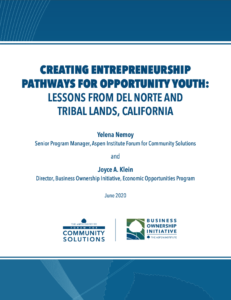 Creating Entrepreneurship Pathways for Opportunity Youth: Lessons from Del Norte and Tribal Lands, California
Creating Entrepreneurship Pathways for Opportunity Youth: Lessons from Del Norte and Tribal Lands, California
The Aspen Institute Forum for Community Solutions, Business Ownership Initiative
First published October 2020
COVID-19 arrived in the US over six months ago, and our economy continues to suffer its effects. This is especially true for opportunity youth, young people between the ages of 16 and 24 who are disconnected from our economy, neither employed nor in school. Young people of color and young people living in rural areas experience disproportionate rates of disconnection. There were nearly five million opportunity youth at last count, and that was before the pandemic, in a nominally “healthy” economy. We know this number will increase greatly amid the fallout. Among the urgent tasks we must undertake as we rebuild is connecting these young people to the economy that left them behind. Communities must remove barriers, connect the systems that touch their lives, and develop pathways to education and employment.
In 2017, the Aspen Institute Forum for Community Solutions launched the Youth Entrepreneurship Fund, which explores entrepreneurship as a pathway to economic self-determination and wealth-building for opportunity youth. Del Norte County and Tribal Lands, California; Philadelphia, Pennsylvania; and San Francisco, California received YEF grants. The Aspen Forum partnered with the Aspen Institute’s Business Ownership Initiative to co-lead a community of practice among the YEF grantees and document the learnings from this work. Their new case study, “Creating Entrepreneurship Pathways for Opportunity Youth: Lessons From Del Norte and Tribal Lands, California,” explores the local context and history of the opportunity youth efforts and how entrepreneurship fits into the larger body of community-building work in Del Norte. The local collaborative has developed a shared vision to improve community health and a focus on locally led economic development that responds to community workforce needs, engaged young leaders and community organizers to identify and solve local challenges, and implemented the use of human-centered design principles as a strategy to bring community together around solving challenges and envisioning a better Del Norte.
Download Resource